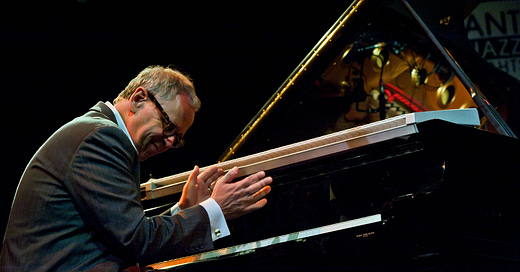Effortless Mastery Part 1 — Kenny Werner on Making Music Fun
Releasing the ego, mastering the minimum, and making deeper statements
I started playing guitar to make a holy sound and have fun.
I still remember how I felt after learning my first three chords in the key of E (the power center of the guitar): When those open strings vibrated and spoke, I got a dopamine-fueled hit of deep pleasure.
Over the years my ambitions multiplied. I tried to memorize dozens of tunes. I spent hours staring at complex charts about chord-scale relationships. And it wasn’t enough for me to know one or two fingerings for a C Major Seventh chord. No, I had to learn every one in the Joe Pass book.
One day I left a band rehearsal and admitted that I’d hit bottom.
Playing music wasn’t fun any more. There was a continuously widening gap between how I wanted to sound and what I heard coming out of my amplifier. During gigs I discovered that most of the chords and scales I’d practiced were suddenly out of reach. I felt self-conscious, self-critical (I sound like SHIT), and constantly afraid of making mistakes.
The solution seemed simple: practice more. And yet I never found a direct relationship between practice time and performance ease.
Yes, there were isolated moments of joy when the guitar seemed to play itself and I just watched it happen. But those delicious flow states were random and accidental.
Then Kenny Werner happened.
A friend of mine (a sax player, not a guitarist) recommended Kenny’s book Effortless Mastery: Liberating the Master Musician Within. It will change your life, he said.
He was right. Kenny revealed that I wasn’t alone in my musical misery. It happens to lots of players, including professionals.
Even so, we’re all geniuses by nature and playing music is meant to be fun. If it’s not, then there’s something you can do about it.
Understanding the problem
Music stops being fun when it’s all about ego — self-centered thinking that’s based on beliefs such as:
I’m only as good as my last gig.
Every solo is a test of my self-worth.
If I hear somebody who plays better than me, then I’m worthless.
Those beliefs create fear of sounding bad and excessive thinking — analyzing my note choices, chord voicings, and solo structure during the very act playing. Instead of being present to the performance and the other musicians, I get trapped in the prison of my mind.
By the time I picked up Effortless Mastery I’d also noticed that it’s possible to practice every day for years and still not improve as a musician. This horrified me until I understood the cycle of self-defeat: Fear of not knowing enough leads me to rush through exercises and tunes. My self-critical ego amplifies that fear, and I react by multiplying effort — thinking more and trying harder.
It’s a vicious cycle: How can I possibly make music in the midst of all that noise?
The solution is to practice in a way that releases ego, fear, and excess thinking. That’s what Effortless Mastery is about.
Mastering the minimum
I’ve mastered a piece of music when I can play it perfectly every time, without effort and without thought. Playing an entire exercise or a tune feels as simple as playing one note and as effortless as speaking. The piece plays itself while I watch it unfold and listen with delight. It’s like Kenny says: “Let the higher power play the music!”
Getting to that sacred place is not matter of what I practice. It’s about how I practice.
Someone asked Bill Evans, the great jazz piano player, about how he practiced. “I practice the minimum,” Bill said. He did not mean practicing as little as possible. He meant practicing less material rather than more. It’s about isolating the individual elements of a tune or exercise that hang me up and mastering one element at time before moving on to the next.
Reading Effortless Mastery tempered my grandiose ambitions and grounded me. I might practice only one tune for an entire month or spend years going through one guitar book. That’s okay, because the point of practicing is not to blow through a shelf full of books: It’s to make music that moves people.
Saying more with less
One of the big insights I got from Kenny is that mastery does not depend on knowing a ton of theory or memorizing a hundred licks.
When I listen to masterful players, in fact, I hear repetition. These musicians didn’t become great by trying to learn everything. Instead, they learned a precious few things — a minimum number of patterns and musical devices — that combined to create a distinctive voice.
B. B. King is a perfect example. His playing was pared down to the minimum — basically, the blues scale. And yet B. B. played those few notes with such feeling that I wanted to cry for joy.
“Many of our favorite artists are not overwhelming technicians, but make deep statements,” says Kenny. That’s true of B. B. and my other favorite players as well.
In my next post I’ll dive into the core principles and practices of Effortless Mastery. Until then, check out this video by the master himself.




